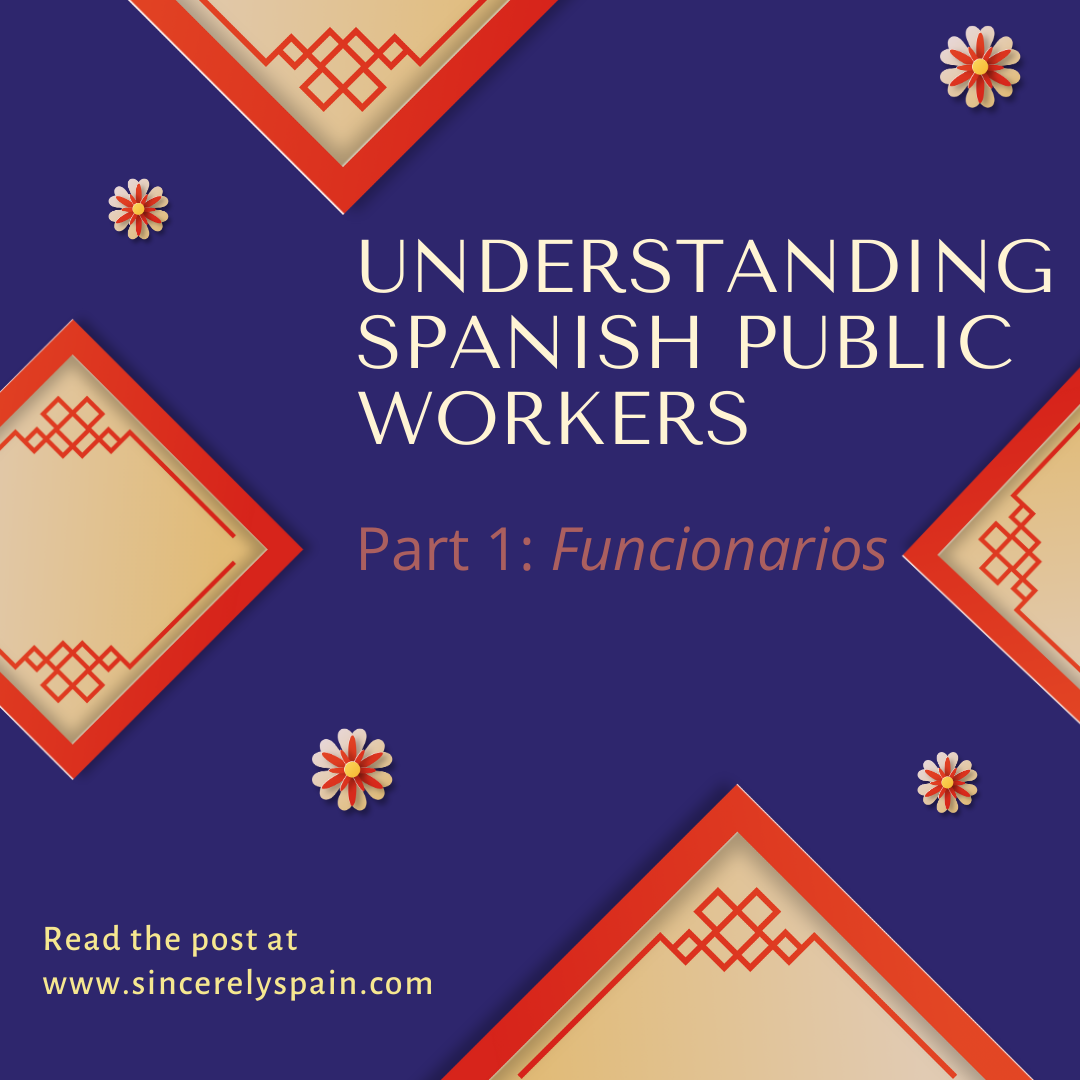
Understanding Spanish Public Workers: Funcionarios
Dear Gabby,
If you are in Spain for any period of time and have to go through any sort of bureaucratic process, I am sure you will hear the word ‘funcionario(s)’ and, if you dig deeper into this subject or have Spanish friends at university, you will probably hear the word ‘oposiciones’ connected to it. Now, we wouldn’t blame you at all if you didn’t know what these words meant and us asked me “What are oposiciones and funcionarios?” As neither of these terms conceptualize something that is common in the States, we find understanding and being able to explain these words and their meaning to be difficult. At their most basic level, they are the entrance exam (oposiciones) for and the position of public workers (funcionarios) in Spain. However, we would like to dive a bit deeper into this subject with you today as we honestly feel that understanding how this system works can help you understand other aspects of Spanish culture.
Note: As it is quite a dense idea, today we are staying with funcionarios but you can find the post on oposiciones here.
What are Funcionarios?
Like already stated, funcionarios are public workers in Spain. They will be the people who do everything from clean your street to decide if you have enough reason to be in the country to approve your visa. Funcionarios work in the universities, hospitals, offices, etc. and have a really important role in everyday Spanish life. I would go as far to say that the jobs they do are essential for how the system works here and, in fact, without funcionarios, it would probably fall apart.
At the same time, the work they do is highly criticized by people who want to get help from the office or department where funcionarios are. Public workers as seen as people who, once they are part of the system, don’t want to learn more or improve on what is already established. It is considered by some that funcionarios only do the very specific job that is assigned to them and that if, for example, you don’t have all the paper to fulfill a particular process in their office, they will tell you to leave and come back another day when you have what they are looking for. There are also jokes about funcionarios going for coffee as soon as they arrive to the office.
However, we have personally worked and interacted with a large number of funcionarios in our time in Spain and, while you can find people who don’t care about the job they are doing, many times you will also find someone who will go out of their way to help others. We know teachers who dedicate themselves to their jobs and are constantly looking for ways to improve and we know administrative workers who do everything they can to make everyone’s life easier around them—even at a cost to themselves.
Note: Although we have a complicated relationship with the idea and system of funcionarios, we still want to recognize the work that they do and appreciate many individuals who do their job excellently. The next section is completely subjective and not objective at all.
What does this mean for workers and youth?
Although we personally don’t find the job of a funcionario to be appealing, it is something that is the back of the minds of most Spanish youth and even for people who have other sorts of jobs. This is not because funcionarios have the most interesting positions. Instead, it is because the Spanish government guarantees that funcionarios have good pay, good health insurance, a decent amount of yearly holiday, etc. In a country that in the last century suffered a civil war, a dictatorship, a (re)transformation to a democratic system, and the current political situation (which is complicated, to say the least, and getting more complex as time goes by), we can understand that people want stability in their work life. As a funcionario, you don’t have to worry about receiving a paycheck or a pension and you get to count on having annual leave, relatively high standing within the community, etc.
On the flip side, we find that only about half of the public workers that you’ll have come across (if that), are actually happy and efficient in their jobs. It is not uncommon to see people become complacent and just do the bare minimum to get by. Now, we recognize that there are plenty of people who work really hard on constant improvement, but the general stereotype is that you study for the exam and once you pass, it is a free ride. From our perspective, this has a massive impact the youth population.
Many of our under 35 friends (and even friends older than that) truly believe that studying oposiciones and becoming a funcionario is the best option for them in life. They work really hard to get enough experience—which translate to points for the exam—and study their butts off to get into the system. At the same time, we see people studying for jobs that don’t necessarily fit them just because it means they will like the hours and the paycheck they will receive. It means that they lose precious time studying for an exam instead of exploring the options they have around them. At the same time, it fits into what they have been taught as a ‘normal’ way of looking at life (working to live, not living to work) and makes many people very happy. While we have been raised with the societal norm that it’s better to enjoy what you do to earn a living because you spend so much of your life working, Spaniards tend to focus more on life outside of work. Perhaps this is why they are willing to work jobs that aren’t especially interesting or suited to them but offer the promise of consistent holidays and benefits.
 Of course, these are just our opinions and you are perfectly welcome to feel differently. Please stayed tuned for Sunday’s post in which we’ll be bringing a Spaniard’s opinion of oposiciones to the table as well. If you have any questions or comments, please leave them down below and we will do our best to answer them for you.
Of course, these are just our opinions and you are perfectly welcome to feel differently. Please stayed tuned for Sunday’s post in which we’ll be bringing a Spaniard’s opinion of oposiciones to the table as well. If you have any questions or comments, please leave them down below and we will do our best to answer them for you.
Sincerely,
Spain





5 Comments
astrodreamer18@gmail.com
I saw interesting your post, but there is some facts that you miss. I am a spanish funcionario. So, I will not waste your time.
According to the text, you only talked about a tiny part of the funcionarios. I can see that you only lived in Andalusia (Andalucía in Spanish) and it is more common to see funcionarios of the Autonomous Comunities there, but it is rarer to see the ones of the central administration of the state (where I belong).
The main thing that you have to know, it is that the selection process of central administration and the Autonomous Comunity are quite different and the motivation of the people who enrolls can differ too. In both administrations they share that you have to compete against other candidates (opositores) in order to get one of the positions offered, but in the Autonomous Comunity there is part named concurso (contest is ) where the position is finally decided by someone who has power (sadly corrupted) to decide if you are in or out. In the central administration you only have a process made by more than 3 or more tests one of them can be an oral one, that it is recorded and anyone can see the candidate solving the oral test in front of a court. So, it is quite hard to get corrupted.
Also the motivation it is different in the central administration. Specially in corps where a university degree is mandary (An example of those corps are Lawer of the State (Abogado del Estado) Tax Inspector (Inspector de Hacienda) and TIC directive). The people who get those corps are highly paid with all the benefits with you mentioned and more (one of the benefits it is that if you want to move to the private sector, you are free to go, and if something happens in the private sector they have their position and your salary saved when you decide to comeback. One example is the ex-president Mariano Rajoy whe was property register who moved to the politics until he was "fired" and he could get back to his position) and the expertise that they get is unique and usefull for the private sector (The CEO of Indidtex, Pablo Isla is a Lawer of the State). In conclusion, being a funcionario it doesn’t mean being stocked in your position forever, it could mean that someone who applies in order to be a funcionario wants to improve in his live and at the sametime have an emergency plan.
Its not your fault that your statement is incomplete, it is because in the place you lived find people who applied the corps that I mentioned, they normally live in Captial cities such as Madrid, Barcelona, Sevilla, Bilbao, etc..
Sincerely, Spain
Dear Opositor,
Thank you for sharing your opinion from inside the system. Like we mentioned in the post, the whole concept of a funcionario (especially the part where you mention that it is an emergency plan) is a bit out of what we know. Even for State wide funcionarios the amount of studying it takes to take the tests to potentially get a position is just something that doesn’t really happen where we come from. We know many people who have studied for and passed all sorts of oposiciones, including people in the central administration, and while it might seem very different for you, for those of us outside the system, it is all very similar.
Best of luck with everything and thank you for commenting,
Dani and Claudia
Opositor
I know that you talked to wide variety of funcionarios. However, the kind of funcionarios that have ambitions are rarer in the place where you live. You should ask for A1 funcionarios of the central administration, specially the younger ones, their vision is completely different. The Fulbright scholarships have special positions for them, I can promise you that hey have a good reason for that
Opositor
Your wellcome, but even the people from my country don’t know all the benefits of being a funcionario. For example, The fullbright schollarship has special offers to funcionarios.